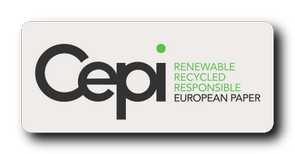The European Commission presented its proposal for a Regulation on ecodesing for sustainable products. The Regulation provides an overarching framework to ensure sustainability considerations are properly accounted for, before a product is placed on the internal market.
The Commission has worked on setting guidelines for sustainable product design, aiming to make products fit for a climate-neutral, resource efficient and circular economy, while reducing waste generation. The proposal also aims to ensure that the performance of frontrunners in sustainability progressively becomes the norm. The pulp and paper industry is already leading in many areas of sustainability, and has pledged to further support the development of sustainable products. However, Cepi, the Confederation of European pulp and paper producers, considers that two important requirements for products sustainability could figure more prominently in the proposed Regulation.
 The ecodesign requirements laid out in the proposal are set up to be applicable to the broadest possible range of products: durability, reusability, upgradability and reparability, the presence of substances of concern in products, product energy and resource efficiency, recycled content in products, product remanufacturing and high-quality recycling, and the reduction of the carbon and environmental footprints. Considering this list, Cepi thinks that the additional requirement of renewability will need to be included and that recyclability should be addressed in a more consistent manner. These two requirements could eventually apply to many products, not limited to the pulp and paper industry, providing that fossil-based materials are progressively replaced with renewable and circular ones:
The ecodesign requirements laid out in the proposal are set up to be applicable to the broadest possible range of products: durability, reusability, upgradability and reparability, the presence of substances of concern in products, product energy and resource efficiency, recycled content in products, product remanufacturing and high-quality recycling, and the reduction of the carbon and environmental footprints. Considering this list, Cepi thinks that the additional requirement of renewability will need to be included and that recyclability should be addressed in a more consistent manner. These two requirements could eventually apply to many products, not limited to the pulp and paper industry, providing that fossil-based materials are progressively replaced with renewable and circular ones:
- Renewability: As the product portfolio of our industry continues to expand, we keep proving that forests can provide alternative solutions to products which are currently made with materials that do not naturally replenish themselves. For this reason, it is important, whenever possible, to incentivise ‘renewable products’ made of resources that can be sustainably managed rather than on finite resources.
- Recyclability: Cepi welcomes that recyclability is addressed as part of the product parameters mentioned in annex I (d) as ‘ease and quality of recycling’. A requirement to design and manufacture products so that they can be recycled, is imperative to product circularity and a key enabler of high-quality recycling. High-quality recycling in the case of paper products means they are recycled back in the paper industry to become new paper products. However, ‘ease of recycling’ needs to be consistently addressed throughout the proposal, for example also in the context of the amounts of waste generated and the ease of re-use annex I (p). Design for recyclability requirements could also address the presence of substances of concerns, which negatively affect the re-use and recycling of a given product. Circularity by Design Guidelines for Fibre-Based Packaging have already been developed within the framework of 4evergreen, a cooperation between brands and the packaging value chain.
The broad requirements laid down in the new Regulation will be complemented by product group specific delegated acts. To ensure policy cohesion and avoiding regulatory overlaps, Cepi acknowledges the Commission’s intention to carefully assess already existing legislation and definitions when drafting the upcoming product-specific delegated acts. For our industry, this would mean consistency with the circularity aspect of fibre-based packaging under the Packaging and Packaging Waste Directive, and coherence with forest-related sustainability requirements, such as in the Renewable Energy Directive. This Directive already includes requirements on energy from sustainable forest management that could similarly apply on products.
Quote:
“In the move towards sustainability, we need to examine sourcing of the raw materials that we use. It is often raw materials that are the biggest cause for concern for the environment, and it is here where change needs to take place. Anything you can do from fossil raw material you can also do from wood in a way that is better for the planet. Europe can be more strategic in using its own renewable resources, waste and leading technology to advance a made-in-Europe industry of the future.”
Jori Ringman, Director General – Cepi (Confederation of the European Paper Industries)
About Cepi :
Cepi is the European association representing the paper industry. We offer a wide range of renewable and recyclable wood-based fibre solutions to EU citizens: from packaging to textile, hygiene and tissue products, printing and graphic papers as well as speciality papers, but also bio-chemicals for food and pharmaceuticals, bio-composites and bioenergy. We are a responsible industry: 86% of our raw materials are sourced from within the European Union and 78% of the wood comes from certified forests, 92% of the water we use is returned in good condition to the environment. We are the world champion in recycling at the rate of 73.9%. At the forefront of the decarbonisation and industrial transformation of our economy, we embrace digitalisation and bring 18.5 billion value addition to the European economy and €4.5 billion investments annually. Through its 18 national associations, Cepi gathers 495 companies operating 895 mills across Europe and directly employing more than 180,000 people.
More information about our sustainability performance here.
